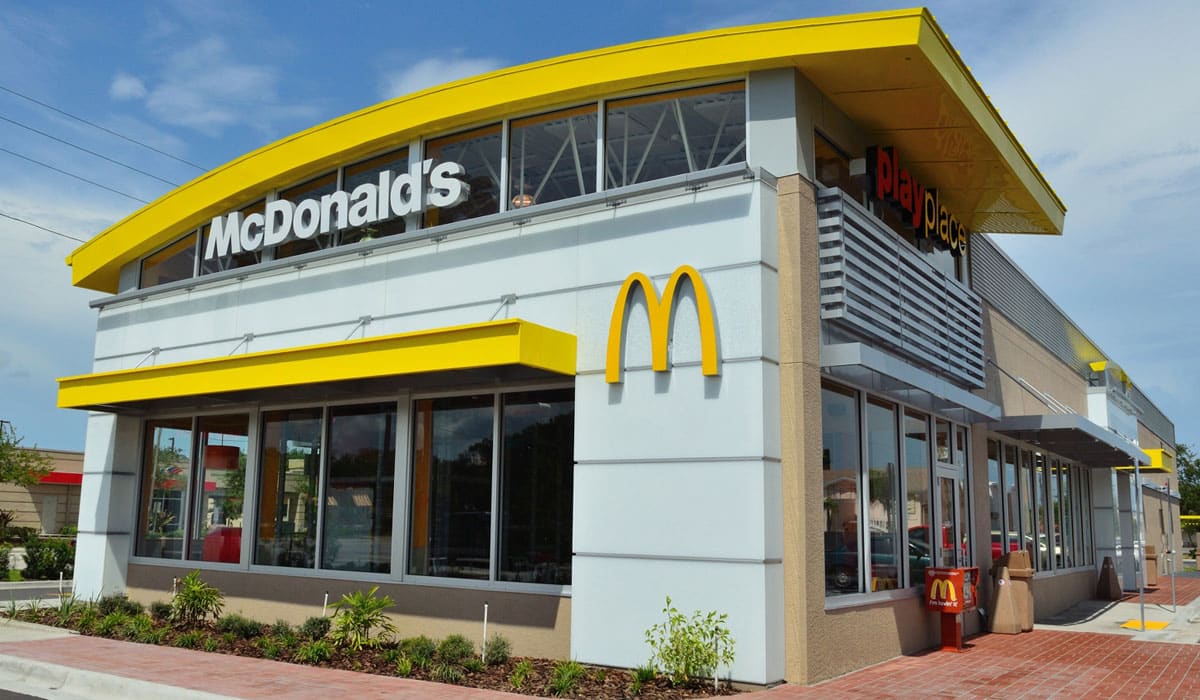Facing COVID-19-driven declines in same-store sales growth, McDonald’s said Wednesday it is cutting capital expenditures by $1 billion in 2020 thanks to fewer Experience of the Future remodel projects in the U.S. and fewer restaurant openings overall.
In January, CFO Kevin Ozan said 500 remodels were completed in Q4, and about 2,000 for all of 2019. At that point, 10,000 units, or 70 percent of locations, were remodeled. The revamp includes digital self-order kiosks, updated counters for new table service, bright and easy-to-read digital menuboards, designated parking spots for curbside pick-up through mobile order and pay, and expanded McCafé counters and larger display cases.
It will mark a significant change of pace for McDonald’s, especially in recent periods. The chain forked up roughly $7 billion on growth initiatives in the past three years. In early 2020, it said it expected this year’s SG&A expenses to increase 5–7 percent as it invested in new technology, among other plans. The total bill was predicted to run about $2.4 billion, with $1.3 billion dedicated just to McDonald’s U.S. business. Additionally, the brand said more than half of that $1.3 billion U.S. target would be allocated to 1,800 Experience of the Future redesigns. Globally, the chain targeted 1,400 or so restaurants and net 1,000 in 2020 alone. McDonald’s corporate set aside $800 million to fund 400 units.
But the global spread of coronavirus quickly derailed that, and sent a strong start to Q1 headed in the other direction.
Through February, McDonald’s saw a 7.2-percent increase in same-store sales systemwide. At domestic stores, comps lifted 8.1 percent, and in international markets, sales grew 8.5 percent. At international licensed markets and corporate units, comps increased 3.7 percent.
But as dining rooms closed in the U.S. and markets shut down completely in some global markets, like the U.K., Spain, France, and Italy, sales dropped sharply.
STAY UP TO DATE WITH OUR CORONAVIRUS LANDING PAGE
In March, comps dropped 22.2 percent systemwide, year-over-year. U.S. stores saw a 13.4 percent decrease while international stores—which experienced more closures—sank 34.7 percent. International licensed markets and company-owned units witnessed a 19.4-percent plummet. McDonald’s finished Q1 with a 3.4 percent slide in comp sales after seeing growth of 5.4 percent in 2019. Domestic units ended with 0.1 percent growth while international stores dropped 6.9 percent. International licensed and corporate stores fell by 4.3 percent.
McDonald’s noted that comp sales through February were driven by growth in average check and traffic. It explained that comps for international licensed markets were primarily harmed by closures in China, where 25 percent of restaurants were fully shuttered at one point in February.
Overall, 75 percent of stores are now operational. McDonald’s said 99 percent of U.S. stores are running, albeit via drive thru, delivery, and/or takeout only. The small percentage of domestic units that are closed have shut down primarily due to location-based restrictions, such as malls.
Forty-five percent of international stores are open, as well as 75 percent of international licensed stores. Markets in Australia, Canada, Germany, and Russia have limited operations, although some units in these areas may be closed or have limited hours, menus and/or restricted capacity.
About 98 percent of units have resumed operations in China. Demand hasn’t returned to pre-COVID-19 levels, however, McDonald’s said. Nearly all restaurants are open in Japan, and 60 percent of stores in Brazil are open.
While the brand has worked on contingencies, there have been no issues in the supply chain globally in terms of food, packaging, toys, or equipment.
To assist franchisees, the brand granted deferrals for rent and royalties in nearly all markets. The length of the deferral may differ depending on the market. McDonald’s is also working with suppliers and lenders to extend payment terms.
To further improve financial flexibility, CEO Chris Kempczinski will cut his salary by 50 percent and other executives will reduce their salary by 25 percent from April 15 to September 30. McDonald’s also suspended its share repurchase program and secured $6.5 billion in new financing.
The brand will provide an update on its Q1 performance on April 30.
“This unprecedented situation is changing the world we live in, and we will need to adapt to a new reality in its aftermath,” Kempczinski said in a statement. “One thing that has not changed, however, is McDonald’s focus on protecting the health and safety of our people and our customers. We are implementing measures across markets to keep customers and crew safe, such as contactless drive-thru and delivery, social distancing guidelines, protective equipment for crew, and enhanced hygiene and cleaning procedures.”
“Our priorities remain the health and safety of our people and our customers, preserving financial flexibility, maintaining discipline and serving our communities where it is safe to do so,” he added. “As we navigate through this unprecedented crisis, we will continue to operate with a long-term mindset, in order to best position ourselves for the future.”







